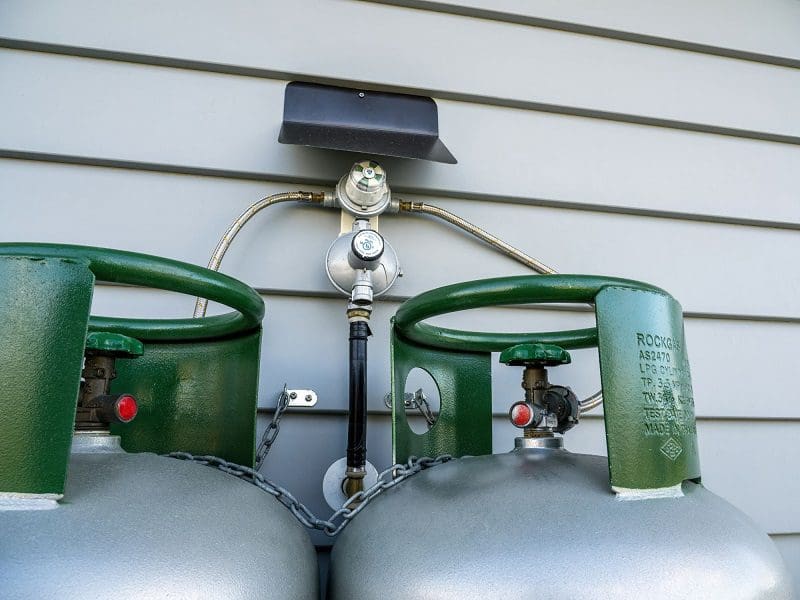Propane gas emerges as a potent yet potentially hazardous entity in fuel sources. Its ubiquitous role in residential heating, commercial applications, and outdoor grilling underscores its importance. However, the inherent risks associated with this fuel source demand an unwavering commitment to strict safety protocols for its handling and storage.
This comprehensive guide intends to demystify the complexities of propane gas. It explores its history and critical properties and illuminates the safety measures crucial for its usage. The guide also offers insight into the best practices for storing propane, elucidates the vital role of regulatory bodies in maintaining safety standards, and examines the environmental impact of propane use.
This guide aims to equip you with the necessary knowledge to store propane gas safely, emphasizing the importance of understanding the potential consequences of improper handling. Let the exploration of this essential topic begin.
Understanding Propane Gas
Propane gas, a byproduct of crude oil refining and natural gas processing, has been a versatile fuel source since its discovery in 1910. In its natural state, it’s colorless, odorless, and conveniently converts to a liquid for transport, like when carried out by a propane gas delivery service.
It’s vital to note that being heavier than air, propane settles in low spaces when leaked, posing a safety risk. However, with proper equipment and safety practices, these risks are manageable. Lastly, propane’s high combustion efficiency makes it a cost-effective and relatively eco-friendly fuel source. Understanding these properties and potential hazards is critical to their safe use.
Potential Risks And Hazards Of Propane Gas
Despite its many benefits, propane gas carries certain risks and hazards that you must be aware of to ensure safe handling and storage. Some of these include:
- Propane gas leaks – When there’s a leak, the risk of fire or explosion becomes significant due to the accumulation of the substance in the air. Its distinct rotten egg-like odor, added for safety, can help detect early leaks.
- Improper appliance use – Misusing propane-fueled appliances can lead to dangerous situations. For example, using outdoor propane equipment indoors can cause carbon monoxide buildup, leading to potential poisoning.
- Faulty equipment – Equipment malfunctions or failures, such as faulty valves or damaged hoses, can result in leaks or explosions. Regular inspections and maintenance can help prevent such incidents.
- Incorrect cylinder disposal – Improper disposal of propane cylinders can lead to safety risks, as remaining gas can ignite. Following local regulations and guidelines is essential when disposing of used propane cylinders.
- Unsafe Storage Conditions – Storing propane gas cylinders in high-temperature areas or near flammable substances can pose significant risks. Appropriate storage is crucial to prevent accidents.
By understanding and being vigilant about these risks, individuals can significantly enhance their safety when using propane gas and make informed decisions about its handling, usage, and storage.
Safety Guidelines For Handling Propane Gas
Everyone can safely utilize propane gas when they take appropriate precautions. Understanding the correct handling procedures is vital for home heating, cooking, or powering certain types of equipment. Here are some essential safety measures:
- Correct use of appliances – Ensure to follow the manufacturer’s instructions when operating propane-fueled devices. As mentioned, never use outdoor propane appliances indoors, which can lead to carbon monoxide buildup.
- Regular Equipment Checks – Inspect your propane equipment regularly for potential issues. Look for visible damage, wear and tear, or unusual functioning.
- Immediate Leak Response – If you detect a gas leak (noted by the distinct odor), immediately turn off the gas, leave the area, avoid causing any sparks, and call a professional to handle the situation.
- Professional Installation and Maintenance – Always hire qualified professionals to install and maintain your propane systems. They have the necessary expertise to ensure all safety protocols are in place.
You can use propane gas efficiently and safely by adhering to these safety protocols.
Best Practices for Storing Propane Gas
Proper propane gas storage is critical in ensuring the safety of its users and the environment. Here are the best practices for storing propane gas:
- Appropriate Storage Locations – You must store propane tanks in an open, well-ventilated area. Indoor storage or placement in a closed space can lead to dangerous gas accumulation in case of a leak.
- Safe Distance – The tanks should be stored safely from ignition sources or flammable materials to minimize the risk of accidents.
- Correct Positioning – Ensure propane cylinders are stored upright to maintain the safety valve’s effectiveness and prevent gas from escaping.
- Avoid High Temperatures – Keep propane tanks away from areas of high temperatures. Exposure to heat can increase the pressure inside the tank, leading to potential discharges or even explosions.
- Regular Inspections – Periodically inspect the tanks for any signs of damage, rust, or drips. If you notice any concerns, seeking expert help for further evaluation is vital.
- Storage Limitations – Be aware of local regulations regarding how much propane you can keep in a residential or commercial area. Even in the face of pending price increases, it’s crucial not to be tempted to store more than necessary, as exceeding these limits can compromise safety. Adhering to these regulations is essential not just for legal compliance but also for ensuring the well-being of everyone in the vicinity.
By adopting these best practices, you can safely store propane gas, reducing the potential risks associated with its use and ensuring a safer environment.
The Role Of Regulatory Agencies
Regulatory agencies are essential in ensuring propane gas’s safe handling and storage. These bodies establish guidelines and standards that govern propane production, transportation, storage, and use. They oversee the enforcement of safety protocols, conduct inspections, and implement corrective actions in case of violations. “Moreover, they raise awareness and provide educational resources to underscore the importance of safety measures.
Propane Gas And The Environment
The environmental impact of propane gas is another vital aspect to consider. As a clean-burning fuel, propane is one of the lesser contributors to greenhouse gas emissions than traditional fossil fuels. It emits fewer pollutants, making it a preferred choice regarding air quality. The Clean Air Act of 1990 in the United States and the Energy Policy Act of 1992 have recognized propane as a viable alternative fuel.
However, it’s essential to remember that, like all fuels, propane extraction and usage still impact the environment. Therefore, efficient use and proper safety protocols are crucial to minimize its environmental footprint. Through careful handling and responsible use, propane can be a part of the journey toward more sustainable energy practices.
Final Thoughts
Understanding the intricacies of propane gas, from its unique properties to potential hazards, underscores the importance of safety-first approaches. Implementing the measures detailed in this guide can significantly reduce risks. This understanding empowers you to benefit from this efficient fuel source while prioritizing safety. Armed with this insight, you can contribute to a safer and more environmentally conscious society.








